NARBO
Focus Area Session 5 (FAS5): Water Risks and Resilience
Sonephet Phosalath
Nam Thuen-Nam Kading River Basin Committee Secretariat
Ministry of Natural Resource and Environment, Lao PDR
![]()
On behalf of NARBO member and on behalf of the Nam Theun-Nam Kading River Basin Committee Secretariat, MoNRE in Lao PDR, I am pleased to thank you all for having taken active part in this very important Special Thematic Session on Focus Area Session on Water Risks and Resilience together with High-panel Discussion “Addressing water and disasters in Asia” in Asia Pacific Water Summit May 19th, 2013 in Chiang Mai, the Kingdom of Thailand.
The chairperson suggested that the post‐2015 agenda needed to address global water challenges and establish measurable targets on IWRM beyond the present water supply and sanitation targets in the MDGs in the opening remarks. Panelists covered a wide range of issues, such as lack of understanding IWRM and appropriate toolkits for the IWRM progress, IWRM conflict management of the Laguna bay experience, managing river basins for multiple uses, trans-boundary data sharing for IWRM, water management through spatial planning in Pakistan, water security and IWRM with special reference to Post 2015 and challenge to achieve water security. Although we confront so many challenges on improving water security, they recognized that we needed to take those challenges as an opportunity to implement IWRM and that we needed new ways to approach water issues.The objective of this session meeting is focusing on Water Risks and Resilience (Focus Area Session 5 (FAS5)), it was recognized that water is life but that water is also a threat to life. Measured by the number of people affected, over 90% of disasters are water-related with the Asia-Pacific region sharing more than 80% of the toll. Water-related disasters are increasing in number and severity, hampering sustainable development. It is imperative that the global community urgently and comprehensively address water-related disasters. The Asia-Pacific region will benefit significantly from this and therefore should take a lead in the process. A clear-cut target on water and disasters in post-2015 is necessary if we are to achieve a significant acceleration in concrete regional cooperation and field-level actions in the region. The establishment of such a target will be technically challenging but with support from the scientific community and participation by multi-stakeholders it is possible.
FAS5 supports the proposal made at the UN Special Thematic Session on Water and Disasters to establish regular discussion process on water and disasters and also to discuss on how a mega-water-disaster strikes country people causing them to suffer, and national development is severely hampered for years, making recovery even more challenging. Many areas of the world are struck by such disasters recurrently. These disasters know no borders, threat value chains and result in political, social and economic shocks, severely affecting sustainable development.
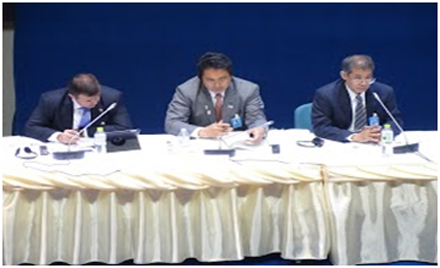 |
Facilitator: Kenzo Hiroki |
Global changes including climate change, population growth and fast urbanization are drastically increasing risks of water-disaster. There are increasingly more people in crowded urban areas who will feel the impact of climate change through water. Green growth will not be materialized without squarely addressing mega-water-disasters.
Having the above in mind, the High-level panel discussion on water and disasters will be held at Focus Area Session on “Water Risks and Resilience” in Asia Pacific Water Summit.
| The following topics have been addressed in the Session | |
● |
Sharing lessons and experiences of water-related disasters in Asia – enhancing leadership, governance and coordination system for effective mitigation of mega-water-disasters |
● |
Addressing Water and Disasters in the context of Post-MDG, SDG and Post-Hyogo Process. |
The Agenda of this meeting was organized by the International Centre on Water Hazard and Risk Management (UNESCO-ICHARM) including Partner Organizations such as NARBO, ICIMOD and others.
Speakers and participants
Facilitator by Kenzo Hiroki, Principal, ICHARM and Special Advisor
UNSGAB Panelists:
□ |
Ministers and Representatives of Governments in Asia (H.E.Manulesagalala Enokatiposala, Minister of Independent State of Samoa) |
|
□ |
Representative, Asian Development Bank (Mr. Woochong Um) | |
□ |
Representative, UN Secretary-General’s Advisory Board on Water and Sanitation (Ms. Olivia Castillo) |
|
□ |
Representatives of Regional/Basin Organizations and Stakeholders: |
|
1. |
Cambodia (H.E Watt Bot Kosal) |
|
2. |
Lao PDR (Ms. Sonephet PHOSALAH) |
|
3. |
Indonesia (Dr. Mochammad Amoron) |
|
4. |
Sri Lanka (Mr. Sudharma Elakanda) |
|
5. |
Tajikistan (H.E Mr. Sulton Rahimov) |
|
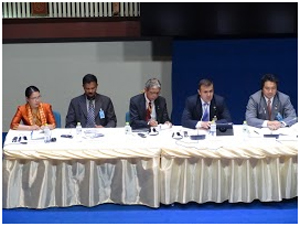 |
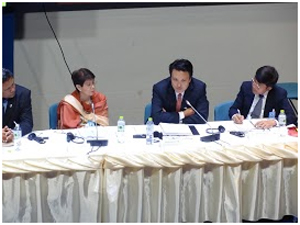 |
Speakers and participants: ICHARM and Special Advisor, UNSGAB Panelists and NABRO
|
|
In this opportunity, each representative of River Basin Organization from different countries had been sharing lessons learned and experiences in addressing problems on water and disaster in their countries. Based on the presentations of the countries, nowadays we are seeing that disaster issues are more increasing in Asia-Pacific Region, according to those issues each countries still lack of capacity, technical adviser, mechanism and budget to support for protection, researching and implementing.
During the panel discussion we also shared opinion on the questions such as follows:
Q1: What are the most important lessons your country/ organization has learned from past
mega-water-disasters?
Q2: Do we need Post-MDG/SDG on Disaster Risk Reduction?
mega-water-disasters?
Q3: What action will you take to advance the agenda of Water and Disaster at Global,
National, Field level?
In those questions each country gave a presentation on water and disaster, which occurred in their home country, and especially we had learned from the problem on water and disaster of Indonesia, Lao PDR and Sri Lanka which gave a presentation in the meeting.
Regarding the results of the 3 questions, the summary is here:
Q1: Based on the presentation and consultation from each country, now we are seeing
that disaster issues are more increasing in Asia-Pacific Region. These disasters may hit
any country at any time.
Q2: Yes, we need Post-MDG (2015) a development Agenda. The SDG should be set
on Disaster Risk Reduction (Targets: Can be reduced % by event/time),
For Example:
when Typhoon/cyclone or Tsunami come, of course the damage or lost of live should be
reduced from one event to another. But we have to be careful.
Q3: Global:
- Advance Technically |
|
- Increase Finance |
|
- National Government should commit more |
|
- Set up networking system for DRR |
|
• National: |
|
- Increase the budget for DRR |
|
- Train government staff |
|
- Increase Finance |
|
- Build infrastructure |
|
- Capacity building community (national & INGOs/NGO) |
|
• Field level: |
|
- Capacity building |
|
| - Drill frequently | |
- Disseminate skills among community members |
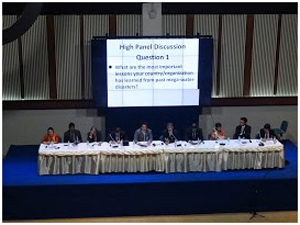 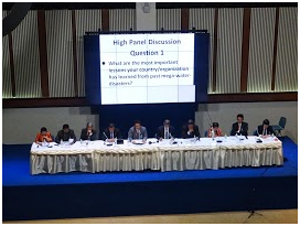 |
||
High-panel Discussion group
|
||
We could not avoid all disasters. But, we could work together to protect people who have survived tsunami, earthquake or flood from a new outbreak of disease and we must address the global disgrace of thousands of people who die every day in silent emergencies caused by dirty water and poor sanitation.
That is why I am an active champion for new momentum and a new push for the Sanitation Drive to 2015. We must promote efforts worldwide to end open defecation by 2025, the major reason for spreading diseases and contamination of water resources.
I would like to thank the High-level Panel on Water and Disaster and Hiroki-san for the important role he has played for our work and for this meeting. And I thank you all for the firm and active attention you are giving to the issue which means the difference between life and death, the difference between devastation and a life in dignity for many millions of people around the world. Now, we have to carry this effort forward into the future.